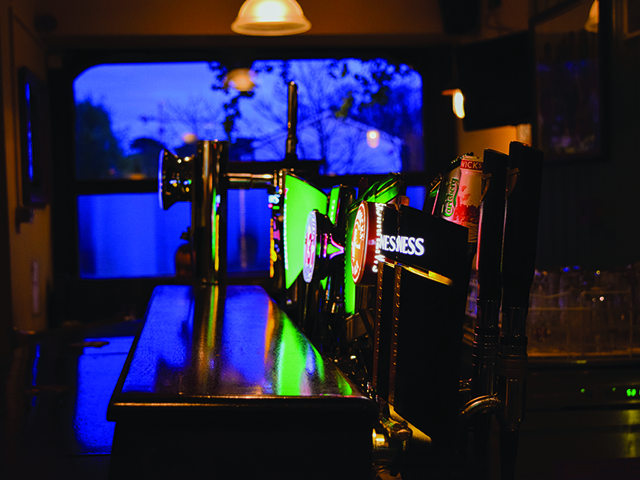
[dropcap]B[/dropcap]ibi Drumm, lifetime parish member and a devout Catholic, sits down in her compact living room, leaning her walking stick gently against the arm of the upholstered chair.
“Once you get over 65 – which I’m well over – you don’t have to fast or abstain for health reasons,” she says. “I wouldn’t be eating sweets but I’m afraid I’ll have a biscuit all right after my dinner.”
For Bibi, celebrating Holy Week is second nature: it’s a ritual in which she has partaken for as long as she can remember. She never drank, and strictly obeys the rules of lent, but she disagrees with the Church imposing fasting practices on the people.
For many thousands of Irish who fell out of sync with Catholic traditions, abstinence is forced upon them again by means of the Good Friday alcohol ban. But, to the perfervid joy of many, news has come that 2017 may be the last year we endure boozing celibacy.
Section 1 of the Intoxicating Liquor Act has remained miraculously untouched since it was signed into law in 1924, and although it met reasonable opposition in recent years, it largely escaped through the cracks of public outcry.
However, the legislation finally looks to be abolished as a new Bill focusing on lifting the ban is set to pass through the Upper House next week, with the change estimated to come into effect next year.
The question we might ask ourselves is, why it took one of Europe’s heaviest drinking populations this long to deal with a prohibition of their favourite pastime.
Interestingly, in the years following the landmark Good Friday Disagreement case of 2010 – in which Limerick pubs were granted an exemption from the ban to host the Celtic League rugby game that fell on the same day – the government never pursued any attempts to permanently amend the legislation, until now.
Key Issues which dominated over the past five years were the marriage referendum and the heavily-politicised abortion debate, both of which swallowed much of the nation’s interest, side-lining the Good Friday ban into the margins of political conversation.
Tánaiste Frances Fitzgerald and Minister for Social Protection Leo Varadkar said they will not oppose any bill that attempts to lift the selling restrictions of alcohol on Good Friday, yet both refused to implement measures.
More often than not, opinions on the issue are one-sided: “It’s time we stopped interfering in each other’s lives”; “Surely self-discipline is not something that is imposed by others?”; “It’s incompetence and a complete lack of understanding of human nature.”
A common view in favour of the ban – and one supported by a litany of figures – is that if it’s lifted, Good Friday will succumb to the same fate as the rest of our celebrated public holidays, which annually turn into messy drinking extravaganzas devoid of any responsibility or care.
Reported figures show an average of 56 people are treated in hospital emergency departments on New Year’s Day – almost twice the average of other days. This is followed up by St. Patrick’s Day with an average of 42 and August bank holiday with 41 admissions.
Combine that with our less-than-favourable alcohol consumption rate – currently at 11.46 and among the highest in Europe – and you’ve got a recipe for disaster.
But this argument doesn’t hold up.
There are a few settings under where the sale of alcohol on Good Friday is lawfully conducted. A restaurant is prohibited from selling alcohol but a licenced theatre isn’t, which means a glass of wine during a play is acceptable but at dinner it’s borderline wrongdoing. It’s doubtful that those were the views of the church.
Those fervently condemning the ban should also note that like many of its time, it was founded on traditionalist principles. The law spawned from a custom that was inherent to the Catholic lifestyle and came at a time when church practices were closely intertwined with state policy.
Many countries maintain that the sale of alcohol on Christmas be outlawed, yet we don’t question that view because it is shared by most cultures across the western hemisphere.
Perhaps the only problem with this tradition is that it slowly became extinct due to political hypocrisy and Catholic authoritarianism. It now seems even priests in Ireland dismiss the legislation as utterly pointless.
Having spent much of her life involved with various Catholic organisations, Bibi thinks the people should be able to decide for themselves. “Since that law came in, a lot has changed,” she says. Indeed it has.
In modern society the key to rediscovering traditional Christian values, while simultaneously achieving a free and independent state, is by undoing the bonds of former Catholic authoritarianism.
In the meanwhile we can all be rest assured knowing that this time next year, we can toast our drinking glasses and head to the nearest tavern to celebrate Good Friday in a bondage of intoxication.
Arthur Velker
Deputy Features Editor



